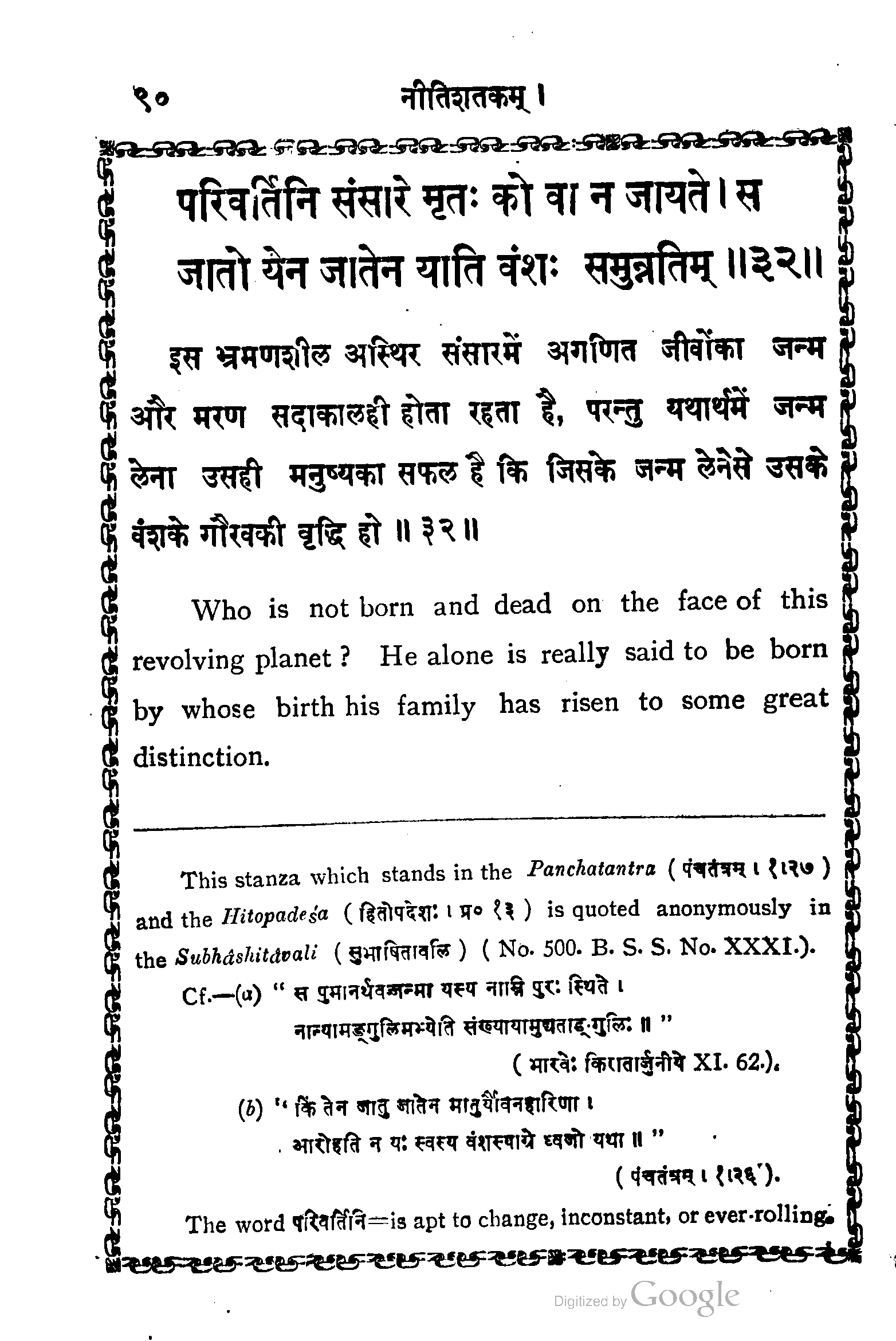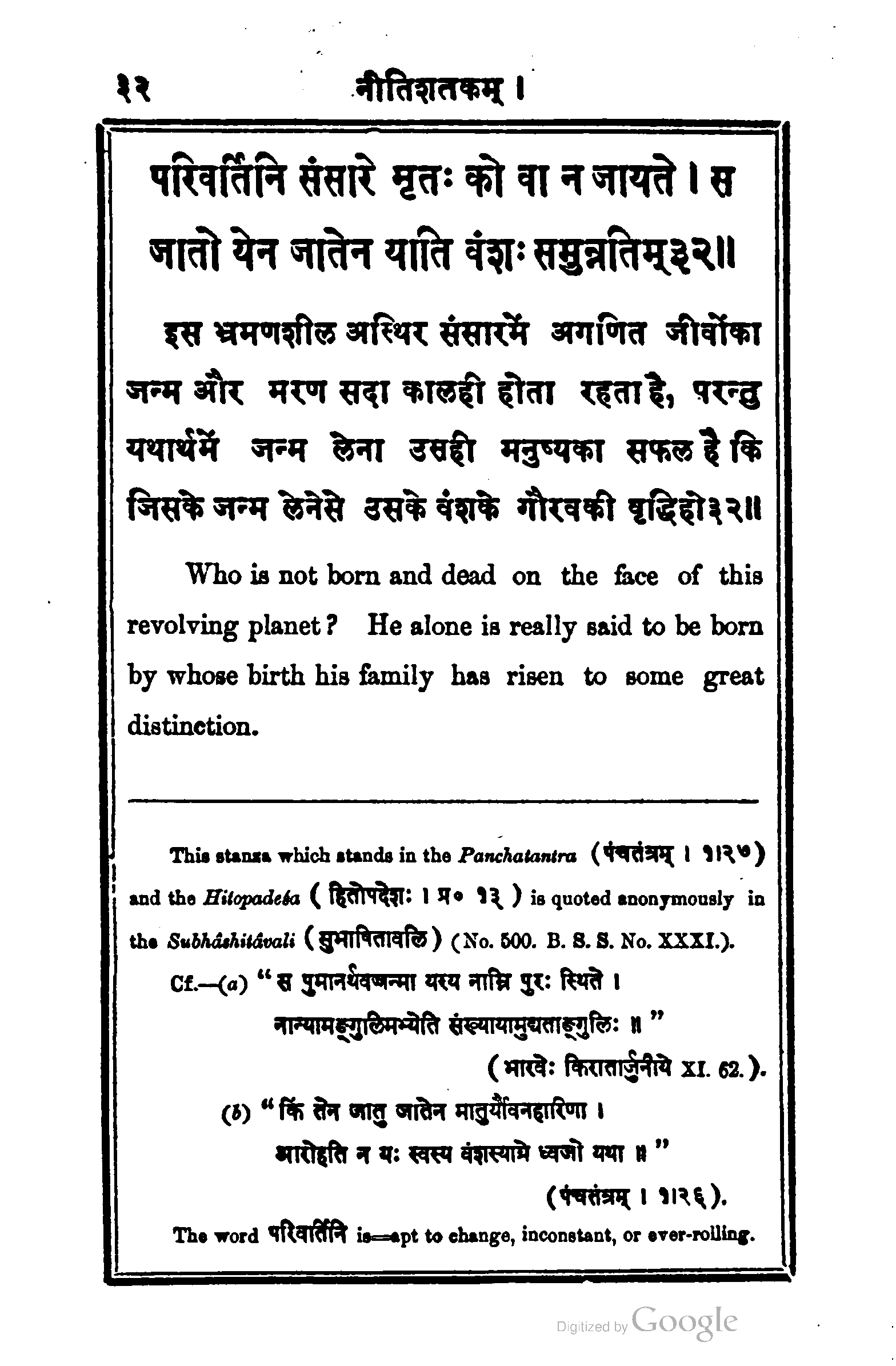Ryder
Tawney
Telang
verse

Text (not proofread)
परिवर्तिनि संसारे मृतः को वा न जायते ।
स जातो येन जातेन याति वैशः समुन्नतिम् ॥ ३२ ॥
footnote

Text (not proofread)
XXXII . ( a ) मृत :; मर्त्यः . P. R. The two lines exchange places
in K. I .. Bo.n.
endnote


Text (not proofread)
St. XXXIL — Ññ³Ñ , revolving , rotating . The allusion is to
the ever - recurring birth and death in this world . AÅ GATĪT
मरणं पुनरा जननीजठरे शयनम् are familiar verses to the same effect .
( They are ascribed to S'ankaracharya . See Kavyasangraha 35 ) .– Kl
f . The particle at is idiomatically used in this way in questious
to add force to them , and may be rendered by ' indoed . ' Comp
Prasannaraghava p . 77 or Bhâminfvilása I. , 98 or Vairâgyas'ataka
St. 60. It is not , I think , the disjunctive here . It may be
noted that the word Et is also somewhat similarly used as in T
: in Vairâgyas'ataka St. 25 or in Kirâta I. , 31 and it is
further worthy of note that is het or STAH . See the quo
tation in Mallinâtha's commentary on Magha XVIII . , 1 and
Siddh . Kaum . I. , 55. In English too , the following expressions
may be compared . ' No such thing , ' ' By what manner of means
did he & c . " On the other hand , may not the word have some
connexion with the TT or TT of the Upanishads ? TT stands before
consonants and generally before vowels ; this might perhaps
lead one to suppose that is there a substitute by Sandhi for
( see for instance S'ârîraka Bhâshya p . 54 and gloss on it ) . But a
passage in the Kaushitaki Upanishad militates against this view .
See p . 19. ( Bibl . Ind . Ed . ) . See also the passage from the S'ata
patha Brâhmana quoted at 2 Muir's Texts 358 ( New Ed . ) . Since
writing the above , I have found that Dr. Kielhorn has explained .
the word differently and as a disjunctive . See Panchatantra I. , p .
7. notes ( Bomb . Classics ) . Anushṭub .
Kosambi
verse

Text (not proofread)
परिवर्तिनि संसारे मृतः को वा न जायते ।
स जातो येन जातेन याति वंशः समुन्नतिम् ॥ ७४ ॥
footnote

Text (not proofread)
74 * Om . in Wai 2 , and Adyar XXIX E 2 ; not found in Rānā Pratāp's
trans . Fs X order cdab . ( 4 ) I Y1A परिवर्तनि ; J1 वृत्तिनि ; Y3 वर्त्मनि . - ० ) B2 F4
H I मर्त्यः ; F3 श्रुतः ; Y7 नरः ; M + मदः ( for मृतः ) . E2 Fs कोपि ; M + कोपान् ( for को वा ) .
F 1 जनायते ; F3 om .; Ga ( orig . ) न जायति . c ) F3 J2 न ( for स ) . Bit यातेन ( for
जातेन ) . - d a ) ) A2 A2 जातिवंशः जातिवंश : ; ; J2 याति ममः ; J8 W 1 X 1 याति वंश - ; T3 वंशो याति ; M4 याति
मान : XI समुन्नती :; Ms समुन्नतीं .
BIS . 6681 ( 3107 ) Bhartr ed . Bohl . 2. 24. Jith ed . I , II and Galan 32 .
Hit . ed . Schl . Pr . 13. Johns 14. Paie . ed . koseg . I. 33. ed . Bomb . 27. Subhash . 63 ;
SRB . p . 98.7 ; SBL . 500 ; SRH . 168. 10 ; SRK . p . 120. 5 ( Hit ) ; SM . 1676 ;
SSD . 2. f . 113 ; SSV . 1660 .

